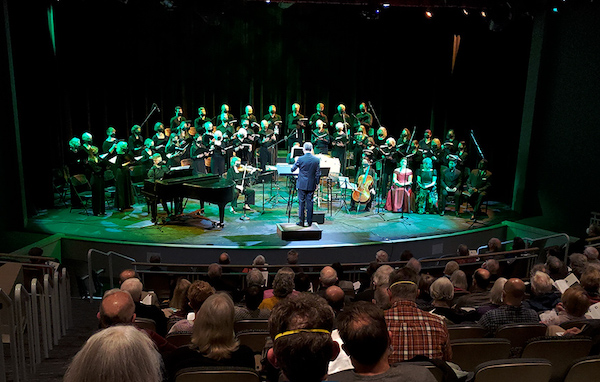Rudoi’s homegrown “Passion” misses musical transcendence in Boston Cecilia’s world premiere

Michael Barrett conducted Boston Cecilia in the world premiere of Paul John Rudoi’s Our Transcendental Passion Sunday at the Umbrella Arts Center in Concord. Photo: George Imirzian
The urge to Americanize European musical forms isn’t as trendy today as it was a century ago.
But the notion fires Paul John Rudoi’s Our Transcendental Passion, all the same: after singing the St. John Passion in Oregon some years back, the composer found himself wishing for an American counterpart to Bach’s tradition. The present score, which received its belated world premiere this weekend from The Boston Cecilia and music director Michael Barrett, is a contribution to that effort.
Commissioned by the Cecilia and originally scheduled to be presented prior to the pandemic, Rudoi’s hour-plus-long score celebrates the eponymous, 19th-century, New England-grown philosophical tradition. Its three parts set texts by various writers—William Ellery Channing, Ralph Waldo Emerson, and Louisa May Alcott, among them—in an effort, as the composer’s puts it, to “embody the movement’s hopes and dreams in a modern context.”
Some of its passages—like Margaret Fuller’s meditations on gender and excerpts from Henry David Thoreau’s “Civil Disobedience”—feel enduringly contemporary. And, while other of the work’s selections are more abstract or meditative in character, the overall libretto does justice to the intellectual breadth of Transcendentalism while also reminding of its enduring influence on wider American thought.
Rudoi’s score aims for similar musical catholicity. The genre of the passion is decidedly Old World, and the composer doesn’t shy away from its traditional reference points: the music is organized around choruses, chorales, arias, recitatives, and the like.
However, it is given a distinctively American flavor in two fundamental ways. First, the chorales are all based on tunes taken from the folk-hymn anthology, The Sacred Harp. Secondly, Rudoi includes an Appalachian dulcimer in the accompanying chamber ensemble. This often gives the proceedings a welcome, rustic aspect. The chorales, with their strong melodies and idiomatic reharmonizations, are the Passion’s most successful episodes.
The rest of the piece, though, doesn’t consistently evoke either their natural simplicity or sheer memorability. Rather, Rudoi’s efforts to illustrate the volubility and vigor of the Transcendentals themselves, which often involves a mix of singing, chanting, and speaking of lines, proves hit-or-miss.
Sometimes—like in Part 3’s juxtaposition of “Civil Disobedience” with “The Fugitive Slave Act of 1850”—his busy textures are invigorating. More often, though, the resulting Babel takes on the form of a predictable gesture.
This was, overridingly, the case in Sunday night’s performance of Our Transcendental Passion at The Umbrella Arts Center in Concord.
True, the Arts Center’s theater was something of a liability: its acoustic imperfections required the performing forces to be amplified. As a result, the blend of voices and instruments sounded artificial and the music’s structure never took strong shape.
Even so, the Cecilia’s larger performance felt rhythmically and tonally secure, as did those of the evening’s quartet of soloists— soprano Carley DeFranco, mezzo-soprano Sophie Michaux, tenor Daniel Esteban Lugo, baritone Dana Whiteside—and the accompanying instrumental quintet.
Rather, the primary issues were compositional. For instance, the prose settings in this Passion often lack melodic definition and sound fitfully awkward, as exemplified by the haphazard melismas and odd alternations of spoken and sung lines in Part 2’s excerpts from Emerson’s Nature.
More problematic was the overuse of melodrama—that is, spoken text underlaid with musical accompaniment. This is one of Rudoi’s pets. Hardly a movement goes by that doesn’t employ the device and, while it has the salutary benefit of moving the piece along at speed, it quickly becomes tiresome. Indeed, one felt that the formidable talents of Sunday’s excellent stable of soloists were only partially tapped due to the extensive amount of speechifying in which each of them was required to engage.
Granted, various of these shortcomings were redeemed by Rudoi’s instrumental writing which, if not always imperative, sometimes proved quite fresh. For example, the ethereal textures of bowed suspended cymbal and string harmonics accompanying Elizabeth Palmer Peabody’s “Crawford’s Orpheus” worked exceedingly well. So did Pam Weeks’ bowed dulcimer, together with the wordless chorus, cushioning DeFranco and Michaux in Caroline Sturgis Tappan’s “Lines.” Percussionist Thomas Schmidt’s recurring snare drum riffs were sometimes a touch overpowering in the space but, when called upon, they amply conveyed the music’s serious mood.
Taken together, then, Our Transcendental Passion is a piece that clearly means well. That, musically, it doesn’t fully succeed isn’t necessarily damnatory: it just suggests that the score reflects its subject matter and the country that birthed it better than not.
The Boston Cecilia performs music by Ralph Vaughan Williams, Samuel Coleridge-Taylor, Fanny Mendelssohn Hensel, and Jody Talbot at 8 p.m. June 4 at First Church in Cambridge. bostoncecilia.org
Posted in Performances




